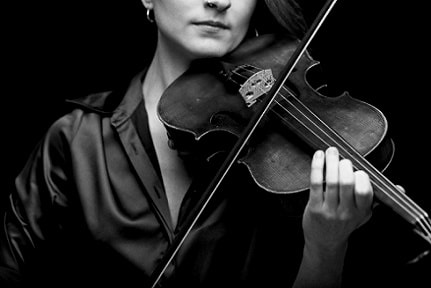The Alexander Technique for Musicians

I'm sure you are familiar with the term that, as a musician, your body is an integral part of that instrument. And, just as your violin needs to be in tune and functioning correctly, so does your body.
However, the slightest amount of tension in your neck, shoulders or back will interfere with your movement and thus effect your performance. Nerves and anxiety are more than enough to increase muscle tension - especially in your neck. But, as I'm sure you're aware, adrenaline is important for a great performance, so how do you get the right balance between preparation to perform and muscle tension?
This is where the Alexander Technique can help. By focusing on yourself in a mindful manner using the Alexander principles, you learn how to 'be in the moment' to take control and deliver your optimum performance.
You may get frustrated by erratic performances. Why does a piece sometimes seem difficult and sound flat, while at other times it just flows and feels easy? This can come down to tiny, unperceivable changes in your body (such as tension in the neck) that may be present one day, but not the next. Using the Alexander Technique will make you more sensitive to the physical aspects of your performance and therefore give you more control.
As a musician, you'll place tremendous demands on your body. Sitting or standing for many hours practice a week, plus the times you're on stage or in the pit performing under pressure, can take its toll. As mentioned above, if you're uncomfortable due to muscle fatigue you can't perform to your best ability.
However, the slightest amount of tension in your neck, shoulders or back will interfere with your movement and thus effect your performance. Nerves and anxiety are more than enough to increase muscle tension - especially in your neck. But, as I'm sure you're aware, adrenaline is important for a great performance, so how do you get the right balance between preparation to perform and muscle tension?
This is where the Alexander Technique can help. By focusing on yourself in a mindful manner using the Alexander principles, you learn how to 'be in the moment' to take control and deliver your optimum performance.
You may get frustrated by erratic performances. Why does a piece sometimes seem difficult and sound flat, while at other times it just flows and feels easy? This can come down to tiny, unperceivable changes in your body (such as tension in the neck) that may be present one day, but not the next. Using the Alexander Technique will make you more sensitive to the physical aspects of your performance and therefore give you more control.
As a musician, you'll place tremendous demands on your body. Sitting or standing for many hours practice a week, plus the times you're on stage or in the pit performing under pressure, can take its toll. As mentioned above, if you're uncomfortable due to muscle fatigue you can't perform to your best ability.
Alexander Technique Courses for Musicians
I've designed a course specifically for musicians that can be delivered at your theatre, school or place of practice, to groups or individuals. I can also offer variations on the course based upon your specific requirements. For example, should you wish to focus on dealing with performance anxiety, a one-hour session can be arranged for groups or individuals. Read client testimonials here.
Introduction to The Alexander Technique for Musicians | Duration: 2.5 hours
The course objective is for musicians to recognise the factors that underpin performance. The two hour session includes:-
Advanced courses
These modular courses are open to those completing the introductory course above. These can be delivered individually in 1 hour sessions, or on a half-day course. The sessions cover:
If you'd like to book a session for your group and talk about costs, please contact me today.
Introduction to The Alexander Technique for Musicians | Duration: 2.5 hours
The course objective is for musicians to recognise the factors that underpin performance. The two hour session includes:-
- Making sitting and standing easy on your back
- The impact of posture on breathing
- Being in the moment
- Preparing to prepare
- Relaxation techniques
Advanced courses
These modular courses are open to those completing the introductory course above. These can be delivered individually in 1 hour sessions, or on a half-day course. The sessions cover:
- Understanding and applying the Marginal Gains and Deliberate Practice methods
- Using the As-If principle to advance your level of performance
- Mindful preparation and performance
- Health & Well-being for the performer
- Visualisation techniques
If you'd like to book a session for your group and talk about costs, please contact me today.